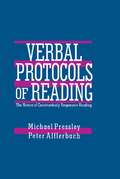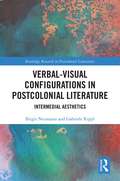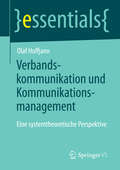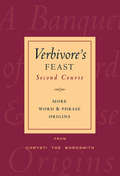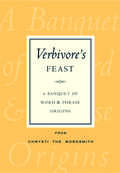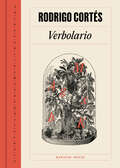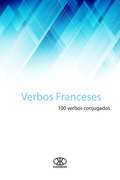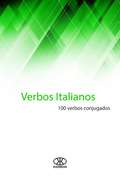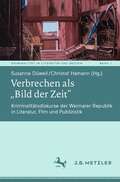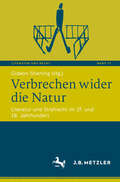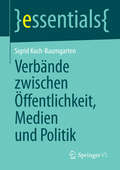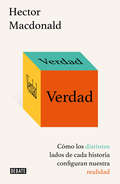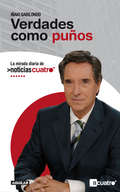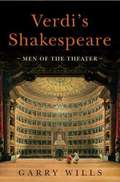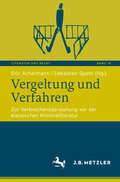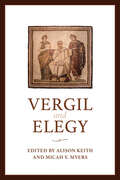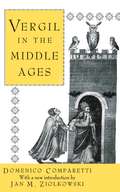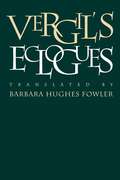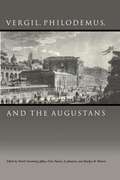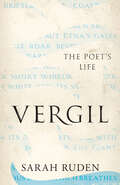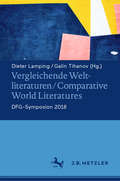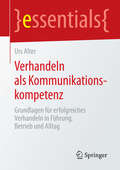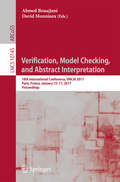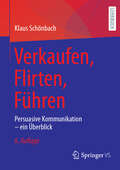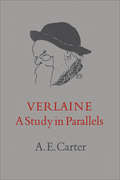- Table View
- List View
Verbal Protocols of Reading: The Nature of Constructively Responsive Reading
by Peter Afflerbach Michael PressleyResearchers from a variety of disciplines have collected verbal protocols of reading as a window on conscious reading processes. Because such work has occurred in different disciplines, many who have conducted verbal protocol analyses have been unaware of the research of others. This volume brings together the existing literature from the various fields in which verbal protocols of reading have been generated. In so doing, the authors provide an organized catalog of all conscious verbal processes reported in studies to date -- the most complete analysis of conscious reading now available in the literature. When the results of all of the studies are considered, there is clear support for a number of models of reading comprehension including reader response theories, schema perspectives, executive processing models, and bottom-up approaches such as the one proposed by van Dijk and Kintsch. The summary of results also demonstrates that none of the existing models goes far enough. Thus, a new framework -- constructively responsive reading -- is described. This new model encompasses reader response, schematic and executive processing, and induction from word- and phrase-level comprehension to higher-order meaning. The important concept in this new model is that readers respond to bits and pieces of text as they are encountered, all as part of the overarching goal of constructing meaning from text. This volume also includes a critical review of the thinking aloud methodology as it has been used thus far. This examination suggests that it continues to be an immature methodology, and that much work is needed if a complete theory of conscious processing during reading is to be developed via verbal protocol analysis. Finally, after reviewing what has been accomplished to date, the authors provide extensive discussion of the work that remains to be done and the adequacy of the verbal protocol methodology for permitting telling conclusions about text processing.
Verbal-Visual Configurations in Postcolonial Literature: Intermedial Aesthetics (Routledge Research in Postcolonial Literatures)
by Gabriele Rippl Birgit NeumannExamining a range of contemporary Anglophone texts, this book opens up postcolonial and transcultural studies for discussions of visuality and vision. It argues that the preoccupation with visual practices in Anglophone literatures addresses the power of images, vision and visual aesthetics to regulate cultural visibility and modes of identification in an unevenly structured world. The representation of visual practices in the imaginative realm of fiction opens up a zone in which established orders of the sayable and visible may be revised and transformed. In 12 chapters, the book examines narrative fiction by writers such as Michael Ondaatje, Derek Walcott, Salman Rushdie, David Dabydeen and NoViolet Bulawayo, who employ word-image relations to explore the historically fraught links between visual practices and the experience of modernity in a transcultural context. Against this conceptual background, the examination of verbal-visual relations will illustrate how Anglophone fiction models alternative modes of re-presentation that reflect critically on hegemonic visual regimes and reach out for new, more pluralized forms of exchange.
Verbandskommunikation und Kommunikationsmanagement: Eine systemtheoretische Perspektive (essentials)
by Olaf HoffjannIn diesem Band wird auf einer systemtheoretischen Grundlage eine Theorie der Verbandskommunikation entwickelt. In Verbänden stellen sich drei zentrale Probleme: das Problem der Legitimation gegenüber dem politisch-administrativen System, das Problem zurückgehender Mitgliederbindungen sowie die Widersprüche, die sich aus der Bearbeitung dieser Probleme ergeben. Zur Lösung dieser drei Probleme haben sich mit der Legitimationskommunikation, der Mitgliederbindungskommunikation und dem integrierten Kommunikationsmanagement drei Disziplinen ausdifferenziert, die der klassischen Verbandskommunikation zugeordnet werden können. Damit wird eine Spezialisierungs- und Integrationsperspektive gleichermaßen eingenommen: Zunächst wird zu untersuchen sein, wie die Probleme fehlender Unterstützung und der Legitimation bearbeitet werden, um anschließend zu fragen, wie die daraus entstehenden Widersprüche bearbeitet werden.
Verbivore's Feast, Second Course: More Word & Phrase Origins
by Chrysti Meuller SmithIn this companion edition to her popular Verbivore’s Feast, Chrysti the Wordsmith once again examines the evolution and history of the English language, using the odd expressions and clichés that pepper it. Exploring words such as lollygag and quack, and phrases ranging from break a leg to shake a stick and from adam’s apple to trip the light fantastic, Chrysti the Wordsmith uncovers fascinating stories about their origins.
Verbivore's Feast: A Banquet of Word & Phrase Origins
by Chrysti Meuller SmithWhat led to the expression "let the cat out of the bag"? Why do we call blondes "towheads"? For Pete's sake, what is a fangle? In this humorous and engaging collection of word origins and histories, the famed host of the "Chrysti the Wordsmith" series (heard on Yellowstone Public Radio, Montana Public Radio, Montana State University's KGLT-FM, and Armed Forces Radio and Television Service) shares the stories behind the words. This irresistible medley is a must for word lovers everywhere.
Verbolario
by Rodrigo CortésRodrigo Cortés regresa a las librerías con Verbolario: diccionario satírico, humorístico y poético, que, con sus más de dos mil definiciones y siete años de trabajo a la espalda, se atreve a enmendarle la plana al diccionario. «Verbolario es un milagro sostenido».Manuel Jabois Toda palabra tiene su significado oculto —su significado verdadero— acechante entre sus pliegues con la astucia del salteador de caminos; se desvela sólo con el uso y sólo ante la perspicacia y el oído, que son el mismo sentido. Rodrigo Cortés reinventa el lenguaje y hace confesar a cada voz su auténtico propósito. Verbolario no define las palabras: las desnuda. La crítica ha dicho:«Selvático y misterioso antidiccionario en que las palabras vuelven a ser territorios a la espera de ser explorados».Laura Fernández «Verbolario es el saloncillo antes de la obra, los camerinos llenos de secretos del diccionario».José Luis Garci «Cortés desvela una realidad que nadie había visto en el lenguaje: las palabras también juegan con nosotros».Jesús García Calero, ABC Cultural «¿Puede un libro ser a la vez diccionario, manual de humor, tratado filosófico y poemario? En manos de Rodrigo Cortés puede».Juan Gómez-Jurado «Con talento y picardía, Rodrigo Cortés logra ponerle a cada palabra de este Verbolario la espina precisa para que el pinchazo nos resulte puñeteramente gozoso».Fernando Aramburu «Enciclopedia ilustrada que mira el mundo con la sabiduría del viejo y la inocencia del niño».Ana Iris Simón «Carcajadas, sonrisas y la leve incomodidad que produce la verdad cuando anda desnuda».Sergio del Molino
Verbos Franceses: 100 verbos conjugados (Colección 101 Verbos Ser.)
by Editorial KaribdisEspecialmente escrito para dispositivos eletrônicos, Verbos Franceses faz uma introdução à construção dos tempos verbais em francês, bem como traz 100 verbos essenciais, totalmente conjugados e com o seu significado. Este livro permite ao usuário pesquisar em todo o texto porque não possui imagens ou textos que desaparecem ou são ilegíveis.
Verbos Italianos: 100 verbos conjugados
by Editorial KaribdisEscrito especialmente para aparelhos eletrônicos, o livro Verbos Italianos apresenta uma introdução à formação de todos os tempos verbais em Italiano, assim como 100 verbos conjugados e com seus significados. Este livro permite ao leitor uma pesquisa fácil através do texto, já que não há imagens, nem texto ilegível.
Verbrechen als „Bild der Zeit“: Kriminalitätsdiskurse der Weimarer Republik in Literatur, Film und Publizistik (Kriminalität in Literatur und Medien #1)
by Christof Hamann Susanne DüwellWährend der Zeit der Weimarer Republik entsteht ein breites Spektrum an Verbrechensdarstellungen und Reflexionen über Kriminalität, das erst zum Teil bzw. in Einzelstudien erforscht ist. Zudem stehen vor allem ausgewählte kanonische kriminalliterarische Texte und Filme im Zentrum des Interesses. Ziel des geplanten Bandes ist es, gerade die Vielfalt und Bandbreite an Darstellungsformen und diskursiven Verhandlungen von Kriminalität zwischen 1918 und 1933 zu diskutieren und dabei literatur-, medien-, diskurs- und wissensgeschichtliche Perspektiven miteinander zu verbinden.
Verbrechen wider die Natur: Literatur und Strafrecht im 17. und 18. Jahrhundert (Literatur und Recht #17)
by Gideon StieningVerbrechen wider die Natur gelten während der frühen Neuzeit als besonders schwerwiegende Vergehen. Sie werden daher in drastischer Weise und oftmals öffentlich bestraft. Sowohl das Vergehen als auch dessen Bestrafung ziehen große Aufmerksamkeit auf sich, so dass sie nicht nur in der Strafrechtstheorie und der Strafrechtspraxis, sondern auch der Philosophie, der Publizistik sowie in der Literatur intensiv und kritisch reflektiert werden. Die Beiträge des Bandes stellen nicht nur die Palette der Vergehen dar, sondern reflektieren auch auf die Begründungen für ihren Vergehenscharakter, das Strafmaß sowie deren allmählichen Wandel im Zeitalter der Aufklärung.
Verbände zwischen Öffentlichkeit, Medien und Politik (essentials)
by Sigrid Koch-BaumgartenDer Titel befasst sich mit dem Wandel der politischen Kommunikation von Verbänden in der Bundesrepublik Deutschland unter den Herausforderungen der Politikbeobachtung durch allgegenwärtige Massenmedien. Nach einer Einführung in die Funktionen und Bedeutung von Verbänden und Medien in der Politikvermittlung zwischen Staat und Gesellschaft werden die neuen Verflechtungen von öffentlichen, medialen und nichtöffentlichen, institutionellen Politikarenen in der Mediengesellschaft sowie deren Rückwirkungen auf die verbandliche Interessenpolitik, Organisation und Binnen- wie Außenkommunikation behandelt. Vorgestellt und diskutiert werden unterschiedliche wissenschaftliche Interpretationsansätze zum Verhältnis von Verbänden und Massenmedien.
Verdad: Cómo los distintos lados de cada historia configuran nuestra realidad
by Hector Macdonald¿Verdad o mentira? Las cosas casi nunca son tan sencillas.Un alegato a favor de la verdad en tiempos de posverdad. Hay más de una verdad acerca de casi todo. Comer carne es nutritivo, pero también perjudicial para el medioambiente. Internet difunde el conocimiento, pero también el odio. Como es lógico, cuando nos comunicamos seleccionamos aquellas verdades que son más favorables a lo que nos interesa defender. Podemos elegir verdades de manera constructiva para inspirar a nuestros compañeros, animar a las nuevas generaciones y fomentar cambios positivos. O podemos optar por aquellas que proyectan una imagen falsa de la realidad y engañan a la gente sin mentir. Los demás pueden hacer lo mismo, motivarnos o manipularnos mediante la verdad. Las verdades son herramientas neutrales y muy versátiles que podemos emplear para bien o para mal. En Verdad, Hector Macdonald explora cómo se usa y abusa de la verdad en la política, los negocios, los medios de comunicación y la vida cotidiana, para demostrar que una mejor comprensión de las muchas caras de la verdad nos ayuda a navegar mejor nuestro mundo e influir más en él. Macdonald combina su talento narrativo con lecciones prácticas y una sucesión de historias fascinantes, divertidas e iluminadoras. Verdad es un libro necesario y adictivo acerca de cuán profundamente nuestras acciones y opiniones se ven influidas por las verdades que deciden contar quienes nos rodean
Verdades como puños: La mirada diaria de Noticias Cuatro
by Iñaki GabilondoUna contundente visión de la realidad política y social que nos revela la verdadera cara de la actualidad. Iñaki Gabilondo es sin lugar a dudas uno de los profesionales del periodismo más reputados del momento. Su ironía y su magistral manera de ver la actualidad se reflejan a diario en los editoriales de cada uno de los informativos que presenta en Cuatro. La calidad y maestría de los mismos, el juego y la genialidad ofrecen entre líneas la verdadera opinión de un maestro, y mueven al espectador al otro lado de la pantalla, lo hacen reflexionar. En definitiva, nunca dejan indiferentes. Verdades como puños reúne estos magistrales editoriales en uno de los mejores análisis de nuestra realidad política y social, que golpean al lector y le revelan la verdadera cara de la actualidad; la mayoría de las veces, la menos grata. -La verdad sin miedo-Políticos sin máscara-La deriva del terrorismo-Las pretensiones de la Iglesia-La crisis que pagamos todos-Las incógnitas del nacionalismo-La corrupción rampante-La debacle financiera-El nuevo equilibrio mundial-La polémica Educación para la Ciudadanía-Sin papeles: el drama de la inmigración-Pánico en el parquet-Los juzgados desbordados-La crisis en el PP
Verdi's Shakespeare
by Garry WillsA dazzling study of the operas Verdi adapted from Shakespeare- and a spellbinding account of their creation. In Verdi's Shakespeare, Pulitzer Prize winner and lifelong opera devotee Garry Wills explores the writing and staging of Verdi's three triumphant Shakespearian operas: Macbeth, Othello, and Falstaff. An Italian composer who couldn't read a word of English but adored Shakespeare, Verdi devoted himself to operatic productions that authentically incorporated the playwright's texts. Wills delves into the fast-paced worlds of these men of the theater, focusing on the intense working relationships both Shakespeare and Verdi had with the performers and producers of their works. We see Verdi study the Shakespearean dramaturgy as he obsessively corresponds with his chosen librettists, handpicks the singers he feels are best- suited to the roles, and coaches them intensely. With fascinating portraits of these artistic giants and their entourages, sharp insights into music and theater, and telling historical details, Verdi's Shakespeare re-creates the conditions that allowed Verdi to complete his masterworks and illuminates the very nature of artistic creation. .
Vergeltung und Verfahren: Zur Verbrechensdarstellung vor der klassischen Kriminalliteratur (Literatur und Recht #16)
by Eric Achermann Sebastian SpethDiesem Band geht es dezidiert nicht darum, eine teleologische Großerzählung zu schreiben, mit der die Erfolgsgeschichte von Kriminalroman und Detektivgeschichte unter Missachtung der jeweiligen historischen Besonderheiten nach vorne verlängert würde. Stattdessen ist das Ziel, alternative Modelle der Erzählung und Darstellung von Kriminalität in verschiedenen Gattungen zu untersuchen – immer unter dem konstitutiven Einbezug des jeweils geltenden rechtlichen Rahmens. Das Spektrum reicht von der klassischen Antike über Mittelalter und Frühe Neuzeit bis an den Punkt, an dem sich das heute vorherrschende Genre-Verständnis mit dem Aufkommen der Detektivfigur verfestigt und verengt.
Vergil and Elegy (Phoenix Supplementary Volumes #60)
by Alison Keith Micah Y. MyersBorn in 70 BCE, the Roman poet Vergil came of age during a period of literary experimentalism among Latin authors. These authors introduced new Greek verse forms and metres into the existing repertoire of Latin poetic genres and measures, foremost among them being elegy, a genre that the ancients thought originated in funeral lament, but which in classical Rome became first-person poetry about the poet-lover’s amatory vicissitudes. Despite the influence of notable elegists on Vergil’s early poetry, his critics have rarely paid attention to his engagement with the genre across his body of work. This collection is devoted to an exploration of Vergil’s multifaceted relations with elegy. Contributors shed light on Vergil’s interactions with the genre and its practitioners across classical, medieval, and early modern periods. The book investigates Vergil’s hexameter poetry in relation to contemporary Latin elegy by Gallus, Tibullus, and Propertius, and the subsequent reception of Vergil’s radical combination of epic with elegy by later Latin and Italian authors. Filling a striking gap in the scholarship, Vergil and Elegy illuminates the famous poet’s wide-ranging engagement with the genre of elegy across his oeuvre.
Vergil in the Middle Ages
by Domenico ComparettiFrom its first complete Italian printing in 1872 up to the present day, Domenico Comparetti's Vergil in the Middle Ages has been acknowledged as a masterpiece, regarded by some critics as "a true and proper history of European consciousness from antiquity to Dante." Treating Vergil's poetry as a foundation of Latin European identity, Comparetti seeks to give a complete history of the medieval conception of the preeminent poet. Scholars of the time had transformed Vergil into a sage and a seer, a type of universal philosopher--even a Christian poet and a guide of a Christian poet. In the mid-twelfth century, there surfaced legends that converted Vergil into a magician, endowing him with supernatural powers. Comparetti explores the ongoing interest in Vergil's poetry as it appeared in popular folklore and legends as well as in medieval classical scholarship. This great synthesizing work, which has been unavailable for over twenty years, is now back in print, based on E.F.M. Benecke's 1895 translation of the Italian second edition. Comparetti begins with the period in which Vergil lived and goes on to evaluate how the later images, particularly the legends, of Vergil coincide with the more scholarly accounts of his life. The result is a grand sweep of literary history from the first century B.C.E. through the end of the Middle Ages, with implications for the nineteenth century and the rise of Italian nationalism.
Vergil's Eclogues
by Barbara Hughes FowlerBest remembered for his unfinished epic, the Aeneid, the poet Vergil was celebrated in his time both for the perfection of his art and for the centrality of his ideas to Roman culture. The Eclogues, his earliest confirmed work, were composed in part out of political considerations: when the Roman authorities threatened to seize his family's land, Vergil's appeal in the form of Eclogue IX won a stay. Eclogue I appears to be a thank-you for that favor. Barbara Hughes Fowler provides scholars and students with a new American verse translation of Vergil's Eclogues. An accomplished translator, Fowler renders the poet's words into an English that is contemporary while remaining close to the spirit of the original. In an introduction to the text, she compares the treatment of the pastoral form by Vergil and Theocritus, illuminating the ways in which Vergil borrowed from and built upon the earlier poet's work, and thereby moved the genre in a new direction.
Vergil, Philodemus, and the Augustans
by Jeffrey Fish David ArmstrongThe Epicurean teacher and poet Philodemus of Gadara (c. 110-c. 40/35 BC) exercised significant literary and philosophical influence on Roman writers of the Augustan Age, most notably the poets Vergil and Horace. <P><P>Yet a modern appreciation for Philodemus' place in Roman intellectual history has had to wait on the decipherment of the charred remains of Philodemus' library, which was buried in Herculaneum by the eruption of Vesuvius in 79 AD. As improved texts and translations of Philodemus' writings have become available since the 1970s, scholars have taken a keen interest in his relations with leading Latin poets.
Vergil: The Poet's Life (Ancient Lives)
by Sarah RudenA biography of Vergil, Rome&’s greatest poet, by the acclaimed translator of the Aeneid The Aeneid stands as a towering work of Classical Roman literature and a gripping dramatization of the best and worst of human nature. In the process of creating this epic poem, Vergil (70–19 BCE) became the world&’s first media celebrity, a living legend. But the real Vergil is a shadowy figure; we know that he was born into a modest rural family, that he led a private and solitary life, and that, in spite of poor health and unusual emotional vulnerabilities, he worked tirelessly to achieve exquisite new effects in verse. Vergil&’s most famous work, the Aeneid, was commissioned by the emperor Augustus, who published the epic despite Vergil&’s dying wish that it be destroyed. Sarah Ruden, widely praised for her translation of the Aeneid, uses evidence from Roman life and history alongside Vergil&’s own writings to make careful deductions to reconstruct his life. Through her intimate knowledge of Vergil&’s work, she brings to life a poet who was committed to creating something astonishingly new and memorable, even at great personal cost.
Vergleichende Weltliteraturen / Comparative World Literatures: DFG-Symposion 2018
by Dieter Lamping Galin TihanovDas Konzept der Weltliteratur ist über die Komparatistik hinaus zu einem grundlegenden Paradigma für die Erforschung der Literatur avanciert, das sich neben dem lange herrschenden nationalen etabliert hat. Die gerade durch neue literarische Entwicklungen komplexer gewordene Logik des Begriffs ‚Weltliteratur‘ reflektiert die verschiedenen Aspekte literarischer Internationalisierung. Sie verweist auch auf theoretische Differenzen, die zugleich eine historische und kulturelle Signatur haben und die deshalb nur komparativ-differenzierend beschrieben werden können. In diesem Sinn stellt die Pluralität der Weltliteratur als Begriff wie als Sache den Ausgangspunkt der Überlegungen des Symposions dar, die sich als in einem starken Sinn vergleichend verstehen und dabei auch über die europäische Literatur und den europäischen Kontext hinausgehen.
Verhandeln als Kommunikationskompetenz: Grundlagen für erfolgreiches Verhandeln in Führung, Betrieb und Alltag (essentials)
by Urs AlterDr. Urs Alter gibt einen Überblick zu Kommunikationskompetenzen und macht mit vielen praktischen Hinweisen Mut, durch Verhandeln Lösungen bei unterschiedlichen Standpunkten zu suchen. Verhandlungen sind in der Beziehung zwischen Menschen alltäglich. Da sie jedoch immer konflikthaft sind und ein breites Repertoire an Kommunikationskompetenzen erfordern, vermeiden viele Menschen Verhandlungen. Dieses Essential zeigt, dass erfolgreiches Verhandeln gelernt werden kann und nicht Repräsentanten von Interessengruppen und hochrangigen Akteuren der Gesellschaft vorbehalten ist.
Verification, Model Checking, and Abstract Interpretation
by Ahmed Bouajjani David MonniauxThis book constitutes the refereed proceedings of the 18th International Conference on Verification, Model Checking, and Abstract Interpretation, VMCAI 2017, held in Paris, France, in January 2017. The 27 full papers together with 3 invited keynotes presented were carefully reviewed and selected from 60 submissions. VMCAI provides topics including: program verification, model checking, abstract interpretation and abstract domains, program synthesis, static analysis, type systems, deductive methods, program certification, debugging techniques, program transformation, optimization, hybrid and cyber-physical systems.
Verkaufen, Flirten, Führen: Persuasive Kommunikation – ein Überblick
by Klaus SchönbachWie und warum gelingt es uns, andere davon zu überzeugen, etwas zu kaufen, uns zu helfen, sich (ver)führen zu lassen? Und was können wir dafür von der Werbung lernen? Ein umfassender Überblick über die Erkenntnisse zur persuasiven Kommunikation - von einem der auch international bekanntesten deutschen Kommunikationswissenschaftler, auf der Erfahrung mit Forschung, Seminaren, Vorlesungen und Kursen aus mehr als 40 Jahren aufgebaut und auf dem neuesten Stand der Wissenschaft. Praktisch, aber mit gründlichem theoretischen Hintergrund. Mit allen Quellenangaben zum Weiterlesen. Für die sechste Auflage wurde der Band aktualisiert und überarbeitet.
Verlaine: A Study in Parallels
by A. E. CarterThe contradictions of Verlaine's nature are mirrored in his verse, which is alternately mystic, sensuous, exquisite and prosaic. He had extraordinary lyric powers; he was a master of eerie harmonies such as few other poets have achieved, and, in Sagesse, he produced religious verse which challenges comparison with the very best of its kind. Yet here and there can be found a curious weakening in the texture of thought and inspiration: he turns and twists, takes flight, seeks reassurance in platitude and convention – marriage, dogmatic theology, reactionary political creeds. He is even capable of lamenting (as Rimbaud shows him in Une Saison en Enfer) the emotional and poetic experiments which give his work its supreme value. It is almost as though he were afraid of his own talent. The explanation, as far as there is one, lies in a combination of personality and circumstance. This biography attempts to explore the "parallels" (Verlaine's own term) between his life and his poetry. Nearly everything he produced, whether good or bad, was a reflection of some crisis of thought or feeling. No one demonstrates better than Verlaine the antinomies between the artist and his work, between the man and the genius; and in every case we are obliged to admit that the one explains the other. Without the weakness and the squalor we might indeed have had a rational human being and a good husband for Mathilde Mauté, but we should have had no poet, or no poet like Paul Verlaine. Professor Carter concentrates on the combination of Verlaine's personality and experiences that produced some of the most brilliant poetry in the French language. The result is one of the best critical biographies of Verlaine published to date.
